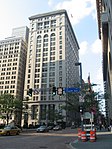Allegheny County Courthouse
Bell towers in the United StatesBuildings and structures in PittsburghCity of Pittsburgh historic designationsCounty courthouses in PennsylvaniaCourthouses on the National Register of Historic Places in Pennsylvania ... and 12 more
Emporis template using building IDGovernment buildings completed in 1888Henry Hobson Richardson buildingsHistoric American Buildings Survey in PennsylvaniaNational Historic Landmarks in PennsylvaniaPittsburgh History & Landmarks Foundation Historic LandmarksRichardsonian Romanesque architecture in PennsylvaniaSkyscraper office buildings in PennsylvaniaSkyscrapers in PittsburghTourist attractions in PittsburghTowers completed in 1888Towers in Pennsylvania

The Allegheny County Courthouse in downtown Pittsburgh, Pennsylvania, is part of a complex (along with the old Allegheny County Jail) designed by H. H. Richardson. The buildings are considered among the finest examples of the Romanesque Revival style for which Richardson is well known. The complex is bordered by wide thoroughfares named for city founders James Ross (Ross Street), John Forbes (Forbes Avenue) and James Grant (Grant Street). The current building, completed in 1888, was designated a National Historic Landmark in 1976. Richardson later referred to it as his "great achievement".
Excerpt from the Wikipedia article Allegheny County Courthouse (License: CC BY-SA 3.0, Authors, Images).Allegheny County Courthouse
Grant Street, Pittsburgh
Geographical coordinates (GPS) Address Website External links Nearby Places Show on map
Geographical coordinates (GPS)
| Latitude | Longitude |
|---|---|
| N 40.4384 ° | E -79.9961 ° |
Address
Allegheny County Courthouse
Grant Street 414
15219 Pittsburgh
Pennsylvania, United States
Open on Google Maps










